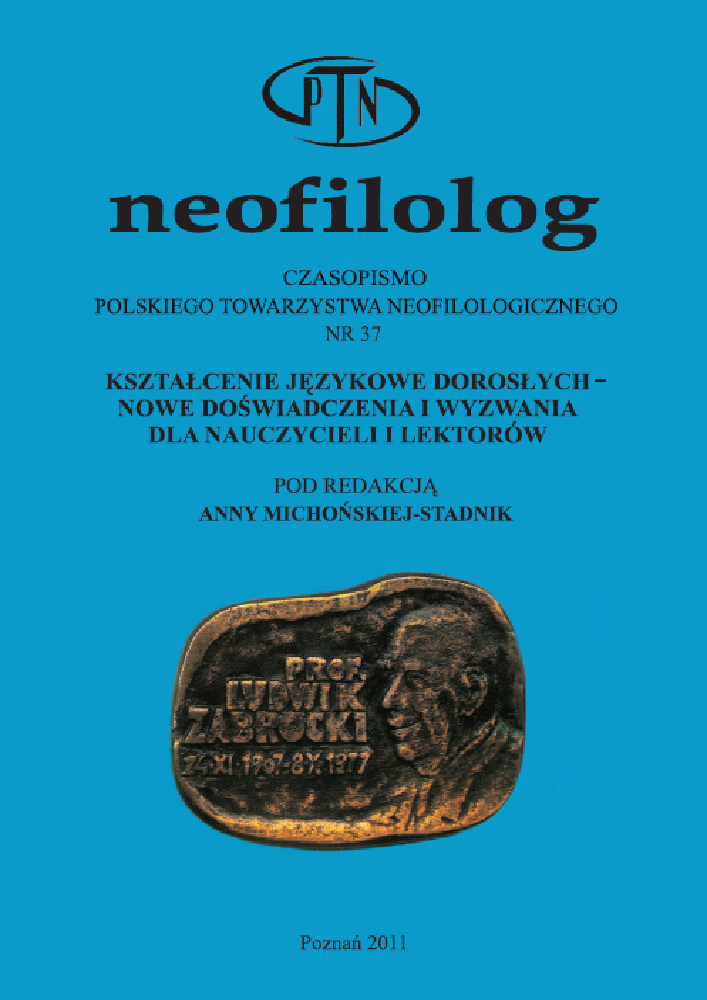Abstrakt
Knowing that there is a definite link between instructor – student interaction and students’ affect, as there is between affect and learning, the article pro-vides a look at the ways in which FL teachers address adult learners. Teaching adult learners in general constitutes a challenge since the group are especially sensitive to self image and easily get demotivated. Teacher’s behaviour, her attitude to the adult student and the atmosphere of learning are among the most important motivational factors for adults. The article is an attempt at presenting specific interactional strategies good teachers practice in order to motivate adults, offer them a sense of security and satisfy their face needs.
Bibliografia
Askildson, L. 2005. „Effects of humor in the language classroom. Humor as a tool in theory and Practice”. Arizona Working Papers in SLAT – Vol. 12, pp 45-61. http://w3.coh.arizona.edu/. DW: 12.03.20011.
Bye, D., Pushkar, D. i Conway, M. 2007. „Motivation, Interest, and Positive Affect in Traditional and Nontraditional Undergraduate Students”. Adult Education Quarterly, 57: 141-158.
De Andres, V. 1999. „Self-esteem in the classroom or the metamorphosis of butterflies.” (w:) Affect in language learning. (red. J. Arnold). Cambridge: Cambridge University Press.
Dörnyei, Z. 2001. Teaching and Researching Motivation. England: Pearson Education Limited.
http://ec.europa.eu/education/languages/language-teaching/doc52_pl.htm. Nauczanie języków obcych. Edukacja dorosłych. DW: 18.02.2011.
Jiang, X. 2010. „A Case Study of Teacher’s Politeness in EFL Class”. Journal of Language Teaching and Research, 5, 651-655. http://ojs.academypublisher.com. DW: 1.03.2011.
Knowles, M. S., E. F. Holton III i R. A. Swanson. 2009. Edukacja dorosłych. Wy-dawnictwo Naukowe PWN.
Komorowska, H. 2007. Metodyka nauczania języków obcych. Warszawa: Fraszka Edukacyjna.
Oxford, R. L. 1999. „Anxiety and the language learner: new insights.” (w:) Affect in language learning. (red. J. Arnold). Cambridge: Cambridge University Press: 58-67.
Pierścieniak, K. 2005. „Specyfika uczenia się dorosłych” (w:) Poradnik Edukatora (red. M. Owczarz). Warszawa: Wydawnictwo CODN: 17-28.
Rapley, T. 2010. Analiza konwersacji, dyskursu i dokumentów. Warszawa: Wydawnictwo Naukowe.
Schmitz, J. R. 2002. „Humor as a pedagogical tool in foreign language and trans-lation courses.” Humor: International Journal of Humor Research, 15-1: 89-113.
Wowro, I. 2009. „Rola treści humorystycznych w nauczaniu języka obcego. Analiza wybranych podręczników do nauki języka niemieckiego.” Neofilo-log, 33: 269-282.
Zhao, W. 2010. „An investigation of students’ face wants in Chinese English teachers’ Classroom Feedback”. Journal of Language Teaching and Research, Vol. 1, No. 1: 29-34.
Licencja
Prawa autorskie (c) 1970 Agnieszka Strzałka

Utwór dostępny jest na licencji Creative Commons Uznanie autorstwa – Bez utworów zależnych 4.0 Międzynarodowe.
Przedstawiany utwór (artykuł) upubliczniany jest na podstawie umowy z autorem i na licencji Creative Commons Attribution-NoDerivatives 4.0 International (CC BY-ND 4.0).
Użytkownicy mają obowiązek podania wraz z rozpowszechnionym utworem, informacji o autorstwie, tytule, źródle (odnośniki do oryginalnego utworu, DOI) oraz samej licencji;
- bez tworzenia utworów zależnych,
- utwór musi być zachowany w oryginalnej postaci.
Uniwersytet im. Adama Mickiewicza w Poznaniu zachowuje prawo do czasopisma jako całości (układ, forma graficzna, tytuł, projekt okładki, logo itp.).
